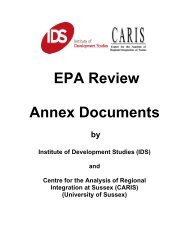The Impact of Energy Use on Poor Urban Livelihoods in ... - DfID
The Impact of Energy Use on Poor Urban Livelihoods in ... - DfID
The Impact of Energy Use on Poor Urban Livelihoods in ... - DfID
Create successful ePaper yourself
Turn your PDF publications into a flip-book with our unique Google optimized e-Paper software.
<str<strong>on</strong>g>The</str<strong>on</strong>g> impact <str<strong>on</strong>g>of</str<strong>on</strong>g> energy <strong>on</strong> poor urban livelihoods, Arusha, Tanzania<br />
F<strong>in</strong>d<strong>in</strong>gs<br />
Of the three ‘modern’ fuels – electricity, LPG, and kerosene – used,<br />
electricity is the fuel aspired to by all four categories <str<strong>on</strong>g>of</str<strong>on</strong>g> households (male<br />
and female headed, poor and n<strong>on</strong>-poor). However, its expense, and the<br />
quality <str<strong>on</strong>g>of</str<strong>on</strong>g> supply means that poor households either cannot afford to use<br />
it or, where they can, have to severely limit its use and even n<strong>on</strong>-poor<br />
households, nearly all <str<strong>on</strong>g>of</str<strong>on</strong>g> whom are c<strong>on</strong>nected to electricity, use it<br />
relatively spar<strong>in</strong>gly. Households are <str<strong>on</strong>g>of</str<strong>on</strong>g>ten not will<strong>in</strong>g to use gas which<br />
they perceive as unsafe because <str<strong>on</strong>g>of</str<strong>on</strong>g> past accidents. Kerosene, the most<br />
easily available fuel, is popular for cook<strong>in</strong>g and light<strong>in</strong>g am<strong>on</strong>gst all the<br />
household groups.<br />
Charcoal is the most popular ‘traditi<strong>on</strong>al’ fuel. It is used by nearly all<br />
households for some cook<strong>in</strong>g and, <strong>in</strong> poorer households, for ir<strong>on</strong><strong>in</strong>g.<br />
<str<strong>on</strong>g>The</str<strong>on</strong>g> study found that households, poor or n<strong>on</strong>-poor, do not make<br />
exclusive use <str<strong>on</strong>g>of</str<strong>on</strong>g> <strong>on</strong>e fuel, nor is <strong>on</strong>ly <strong>on</strong>e fuel type used for <strong>on</strong>ly <strong>on</strong>e<br />
activity. Instead, for a mixture <str<strong>on</strong>g>of</str<strong>on</strong>g> practical and cultural reas<strong>on</strong>s,<br />
households use a mixture <str<strong>on</strong>g>of</str<strong>on</strong>g> modern and traditi<strong>on</strong>al fuels.<br />
<str<strong>on</strong>g>The</str<strong>on</strong>g>re is evidence that women, <strong>in</strong> so far as they can, mix their use <str<strong>on</strong>g>of</str<strong>on</strong>g><br />
fuels <strong>in</strong> order to save cook<strong>in</strong>g time, although us<strong>in</strong>g a variety <str<strong>on</strong>g>of</str<strong>on</strong>g> fuels is<br />
<strong>on</strong>ly <strong>on</strong>e <str<strong>on</strong>g>of</str<strong>on</strong>g> four time sav<strong>in</strong>g strategies. <str<strong>on</strong>g>The</str<strong>on</strong>g> other three are; cook<strong>in</strong>g <strong>in</strong><br />
larger quantities, buy<strong>in</strong>g fuel <strong>in</strong> larger quantities, and chang<strong>in</strong>g to a<br />
different type, or number, <str<strong>on</strong>g>of</str<strong>on</strong>g> cook<strong>in</strong>g stoves. However, the shorter time<br />
spent <strong>on</strong> daily activities <strong>in</strong> n<strong>on</strong>-poor households (where there is greater<br />
use <str<strong>on</strong>g>of</str<strong>on</strong>g> modern fuels) compared with poor households suggests that the<br />
time saved each day would <str<strong>on</strong>g>of</str<strong>on</strong>g>ten be relatively short, unless all<br />
households could have access to reliable and affordable electricity for all<br />
activities. In view <str<strong>on</strong>g>of</str<strong>on</strong>g> Tanzania’s current electricity supply situati<strong>on</strong> and<br />
the relative poverty <str<strong>on</strong>g>of</str<strong>on</strong>g> the households this is unlikely <strong>in</strong> the short to<br />
medium term.<br />
Less than a third <str<strong>on</strong>g>of</str<strong>on</strong>g> women <strong>in</strong> Kaloleni, and a fifth <strong>in</strong> Daraja Mbili,<br />
expressed a desire to take-up an educati<strong>on</strong> or educati<strong>on</strong> related activity<br />
(<strong>in</strong>clud<strong>in</strong>g girls hav<strong>in</strong>g more time for homework or mothers help<strong>in</strong>g<br />
children with homework), with any time saved as a result <str<strong>on</strong>g>of</str<strong>on</strong>g> us<strong>in</strong>g<br />
modern fuel. This compared to a half <str<strong>on</strong>g>of</str<strong>on</strong>g> women <strong>in</strong> Kaloleni and two<br />
thirds <strong>in</strong> Daraja Mbili who would aim to undertake an <strong>in</strong>come generat<strong>in</strong>g<br />
activity, (perhaps not surpris<strong>in</strong>gly <strong>in</strong> households that are lack<strong>in</strong>g <strong>in</strong><br />
<strong>in</strong>come and assets). Moreover, <strong>in</strong> the study area, access to educati<strong>on</strong> is<br />
not just restricted through lack <str<strong>on</strong>g>of</str<strong>on</strong>g> time. Lack <str<strong>on</strong>g>of</str<strong>on</strong>g> m<strong>on</strong>ey to spare for<br />
educati<strong>on</strong>, cultural c<strong>on</strong>stra<strong>in</strong>ts, and lack <str<strong>on</strong>g>of</str<strong>on</strong>g> educati<strong>on</strong>al opportunities are<br />
also factors that need address<strong>in</strong>g if women and girls are to benefit from<br />
improved and <strong>in</strong>creased access to educati<strong>on</strong>.<br />
Daraja Mbili and Kaloleni have c<strong>on</strong>servative attitudes to gender roles,<br />
resp<strong>on</strong>sibilities and rights. <str<strong>on</strong>g>The</str<strong>on</strong>g> generally accepted paradigm, as <strong>in</strong><br />
Tanzania as a whole, is <strong>on</strong>e <strong>in</strong> which men are seen as the bread w<strong>in</strong>ners<br />
and household decisi<strong>on</strong> makers while women are resp<strong>on</strong>sible for<br />
reproductive tasks and are subservient to men. Nevertheless, despite<br />
this stereotype, decisi<strong>on</strong>-mak<strong>in</strong>g patterns <strong>in</strong> households vary, with a<br />
vii<br />
Development Plann<strong>in</strong>g Unit, UCL L<strong>on</strong>d<strong>on</strong><br />
Dr. Sheilah Meikle and Patrice North
















